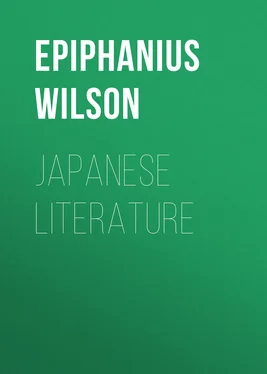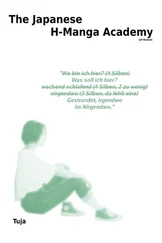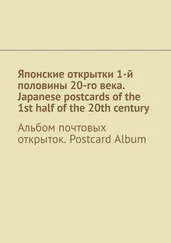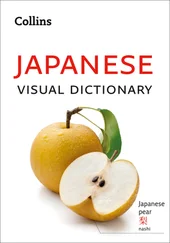Epiphanius Wilson - Japanese Literature
Здесь есть возможность читать онлайн «Epiphanius Wilson - Japanese Literature» — ознакомительный отрывок электронной книги совершенно бесплатно, а после прочтения отрывка купить полную версию. В некоторых случаях можно слушать аудио, скачать через торрент в формате fb2 и присутствует краткое содержание. Жанр: foreign_prose, Языкознание, foreign_antique, на английском языке. Описание произведения, (предисловие) а так же отзывы посетителей доступны на портале библиотеки ЛибКат.
- Название:Japanese Literature
- Автор:
- Жанр:
- Год:неизвестен
- ISBN:нет данных
- Рейтинг книги:3 / 5. Голосов: 1
-
Избранное:Добавить в избранное
- Отзывы:
-
Ваша оценка:
- 60
- 1
- 2
- 3
- 4
- 5
Japanese Literature: краткое содержание, описание и аннотация
Предлагаем к чтению аннотацию, описание, краткое содержание или предисловие (зависит от того, что написал сам автор книги «Japanese Literature»). Если вы не нашли необходимую информацию о книге — напишите в комментариях, мы постараемся отыскать её.
Japanese Literature — читать онлайн ознакомительный отрывок
Ниже представлен текст книги, разбитый по страницам. Система сохранения места последней прочитанной страницы, позволяет с удобством читать онлайн бесплатно книгу «Japanese Literature», без необходимости каждый раз заново искать на чём Вы остановились. Поставьте закладку, и сможете в любой момент перейти на страницу, на которой закончили чтение.
Интервал:
Закладка:
On the return of the Miôbu she found that the Emperor had not yet retired to rest. He was really awaiting her return, but was apparently engaged in admiring the Tsubo-Senzai—or stands of flowers—which were placed in front of the palaces, and in which the flowers were in full bloom. With him were four or five ladies, his intimate friends, with whom he was conversing. In these days his favorite topic of conversation was the "Long Regret." 14 14 A famous Chinese poem, by Hak-rak-ten. The heroine of the poem was Yô-ki-hi, to whom we have made reference before. The story is, that after death she became a fairy, and the Emperor sent a magician to find her. The works of the poet Peh-lo-tien, as it is pronounced by modern Chinese, were the only poems in vogue at that time. Hence, perhaps, the reason of its being frequently quoted.
Nothing pleased him more than to gaze upon the picture of that poem, which had been painted by Prince Teishi-In, or to talk about the native poems on the same subject, which had been composed, at the Royal command, by Ise, the poetess, and by Tsurayuki, the poet. And it was in this way that he was engaged on this particular evening.
To him the Miôbu now went immediately, and she faithfully reported to him all that she had seen, and she gave to him also the answer to his letter. That letter stated that the mother of Kiri-Tsubo felt honored by his gracious inquiries, and that she was so truly grateful that she scarcely knew how to express herself. She proceeded to say that his condescension made her feel at liberty to offer to him the following:—
"Since now no fostering love is found,
And the Hagi tree is dead and sere,
The motherless deer lies on the ground,
Helpless and weak, no shelter near."
The Emperor strove in vain to repress his own emotion; and old memories, dating from the time when he first saw his favorite, rose up before him fast and thick. "How precious has been each moment to me, but yet what a long time has elapsed since then," thought he, and he said to the Miôbu, "How often have I, too, desired to see the daughter of the Dainagon in such a position as her father would have desired to see her. 'Tis in vain to speak of that now!"
A pause, and he continued, "The child, however, may survive, and fortune may have some boon in store for him; and his grandmother's prayer should rather be for long life."
The presents were then shown to him. "Ah," thought he, "could they be the souvenirs sent by the once lost love," as he murmured—
"Oh, could I find some wizard sprite,
To bear my words to her I love,
Beyond the shades of envious night,
To where she dwells in realms above!"
Now the picture of beautiful Yô-ki-hi, however skilful the painter may have been, is after all only a picture. It lacks life and animation. Her features may have been worthily compared to the lotus and to the willow of the Imperial gardens, but the style after all was Chinese, and to the Emperor his lost love was all in all, nor, in his eyes, was any other object comparable to her. Who doubts that they, too, had vowed to unite wings, and intertwine branches! But to what end? The murmur of winds, the music of insects, now only served to cause him melancholy.
In the meantime, in the Koki-Den was heard the sound of music. She who dwelt there, and who had not now for a long time been with the Emperor, was heedlessly protracting her strains until this late hour of the evening.
How painfully must these have sounded to the Emperor!
"Moonlight is gone, and darkness reigns
E'en in the realms 'above the clouds,'
Ah! how can light, or tranquil peace,
Shine o'er that lone and lowly home!"
Thus thought the Emperor, and he did not retire until "the lamps were trimmed to the end!" The sound of the night watch of the right guard 15 15 There were two divisions of the Imperial guard, right and left.
was now heard. It was five o'clock in the morning. So, to avoid notice, he withdrew to his bedroom, but calm slumber hardly visited his eyes. This now became a common occurrence.
When he rose in the morning he would reflect on the time gone by when "they knew not even that the casement was bright." But now, too, he would neglect "Morning Court." His appetite failed him. The delicacies of the so-called "great table" had no temptation for him. Men pitied him much. "There must have been some divine mystery that predetermined the course of their love," said they, "for in matters in which she is concerned he is powerless to reason, and wisdom deserts him. The welfare of the State ceases to interest him." And now people actually began to quote instances that had occurred in a foreign Court.
Weeks and months had elapsed, and the son of Kiri-Tsubo was again at the Palace. In the spring of the following year the first Prince was proclaimed heir-apparent to the throne. Had the Emperor consulted his private feelings, he would have substituted the younger Prince for the elder one. But this was not possible, and, especially for this reason:—There was no influential party to support him, and, moreover, public opinion would also have been strongly opposed to such a measure, which, if effected by arbitrary power, would have become a source of danger. The Emperor, therefore, betrayed no such desire, and repressed all outward appearance of it. And now the public expressed its satisfaction at the self-restraint of the Emperor, and the mother of the first Prince felt at ease.
In this year, the mother of Kiri-Tsubo departed this life. She may not improbably have longed to follow her daughter at an earlier period; and the only regret to which she gave utterance, was that she was forced to leave her grandson, whom she had so tenderly loved.
From this time the young Prince took up his residence in the Imperial palace; and next year, at the age of seven, he began to learn to read and write under the personal superintendence of the Emperor. He now began to take him into the private apartments, among others, of the Koki-den, saying, "The mother is gone! now at least, let the child be received with better feeling." And if even stony-hearted warriors, or bitter enemies, if any such there were, smiled when they saw the boy, the mother of the heir-apparent, too, could not entirely exclude him from her sympathies. This lady had two daughters, and they found in their half-brother a pleasant playmate. Every one was pleased to greet him, and there was already a winning coquetry in his manners, which amused people, and made them like to play with him. We need not allude to his studies in detail, but on musical instruments, such as the flute and the koto , 16 16 The general name for a species of musical instrument resembling the zither, but longer.
he also showed great proficiency.
About this time there arrived an embassy from Corea, and among them was an excellent physiognomist. When the Emperor heard of this, he wished to have the Prince examined by him. It was, however, contrary to the warnings of the Emperor Wuda, to call in foreigners to the Palace. The Prince was, therefore, disguised as the son of one Udaiben, his instructor, with whom he was sent to the Kôro-Kwan, where foreign embassies are entertained.
When the physiognomist saw him, he was amazed, and, turning his own head from side to side, seemed at first to be unable to comprehend the lines of his features, and then said, "His physiognomy argues that he might ascend to the highest position in the State, but, in that case, his reign will be disturbed, and many misfortunes will ensue. If, however, his position should only be that of a great personage in the country, his fortune may be different."
This Udaiben was a clever scholar. He had with the Corean pleasant conversations, and they also interchanged with one another some Chinese poems, in one of which the Corean said what great pleasure it had given him to have seen before his departure, which was now imminent, a youth of such remarkable promise. The Coreans made some valuable presents to the Prince, who had also composed a few lines, and to them, too, many costly gifts were offered from the Imperial treasures.
Читать дальшеИнтервал:
Закладка:
Похожие книги на «Japanese Literature»
Представляем Вашему вниманию похожие книги на «Japanese Literature» списком для выбора. Мы отобрали схожую по названию и смыслу литературу в надежде предоставить читателям больше вариантов отыскать новые, интересные, ещё непрочитанные произведения.
Обсуждение, отзывы о книге «Japanese Literature» и просто собственные мнения читателей. Оставьте ваши комментарии, напишите, что Вы думаете о произведении, его смысле или главных героях. Укажите что конкретно понравилось, а что нет, и почему Вы так считаете.












